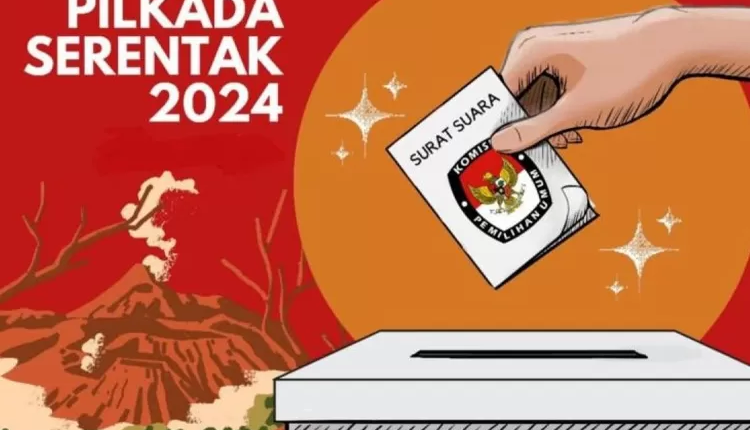Together Present a Peaceful Regional Election Without SARA Issues
By: Silvia AP
In the context of Indonesia’s increasingly mature democracy, the conduct of Regional Head Elections (Pilkada) has become one of the benchmarks for success in strengthening a healthy and inclusive political order. Consistent joint efforts are needed to ensure that regional elections are not merely a political competition, but also a means to strengthen unity and peace without being disturbed by sensitive issues such as ethnicity, religion, race, and intergroup relations. (SARA).
In several cases, issues of ethnicity, religion, race, and inter-group relations (SARA) as well as identity politics are often exploited for political gain. The rise of SARA issues in regional head elections is caused by the weak cadre development within political parties. The process of cadre development is not functioning, elections are not conducted democratically, and ultimately, it often becomes a weapon that divides society.
The 2017 regional elections, the simultaneous regional elections in 2018, and the 2019 elections serve as a very real reflection of how all elements of ethnicity, religion, race, and inter-group relations (SARA) occurred there. There has been a polarization based on the irrationality of identity politics, manifested in the form of malicious campaigns, fake news, slander, and the politicization of ethnicity and religion becoming stronger. The community only observes but cannot intervene, because the role models are community leaders and religious figures who should have a central role in maintaining the conducive situation at that time, yet they instead become very active in voicing identity politics.
In the simultaneous regional elections of 2024, this must not happen, as the public continues to be the victim, while they freely calculate their political gains.
The history of regional elections in several areas records how narratives based on ethnicity, religion, race, and inter-group relations (SARA) have been used by certain parties to stir public emotions in order to achieve specific political goals. This not only endangers the democratic order but also triggers social conflicts that can have long-term effects on harmony and unity in community life.
The Head of the Division of Socialization, Education, Voter and Community Participation of the West Java KPU, Hedi Ardia, hopes that the 2024 Simultaneous Regional Elections will not be colored by narratives that could cause divisions based on ethnicity, religion, race, and inter-group differences. (SARA).
Political education for the community is one important aspect. The public must be given a proper understanding of the importance of choosing based on the capacity and integrity of candidates, rather than on religious, ethnic, or racial sentiments. The government, along with related institutions such as the Ministry of Home Affairs, the General Election Commission, and the Election Supervisory Agency, has conducted massive socialization regarding the dangers of the politicization of ethnicity, religion, race, and inter-group relations (SARA) in regional elections.
In addition, mass media and social media need to remain active in preventing the spread of hoaxes and hate speech that often contain elements of ethnicity, religion, race, and inter-group relations (SARA). With the rapid advancement of information technology, social media has become one of the main platforms where sensitive issues can quickly spread and influence public opinion.
In addition to the government, the role of civil society in promoting the creation of peaceful regional elections is very important. Community organizations, NGOs, religious leaders, community figures, and youth must actively engage in maintaining harmony during the electoral process.
In the concurrent political event, the inauguration of the elected President for 2024-2029, Prabowo Subianto, will take place on October 20, 2024. In the near future, on November 27, 2024, Indonesia will hold simultaneous regional elections. The 2024 simultaneous regional elections will involve 37 provinces and 508 regencies/cities.
In response to the “national event,” President Jokowi has deployed the military and police to maintain security stability. During the transition period, the President emphasized that the military and police must ensure the smooth transition of government from the old administration to the new one. The military and police are also asked to anticipate any possibilities that could disrupt the government transition process as well as the 2024 Simultaneous Regional Elections.
The Indonesian Election Supervisory Board invites regional heads to maintain the neutrality of civil servants as the 2024 regional elections enter the stage of determining pairs of candidates for regional heads and their deputies, considering the numerous candidates from regional heads.
The Chairman of the Indonesian Election Supervisory Agency, Rahmat Bagja, stated that there are three points of vulnerability in the regional election stages that need to be anticipated by regional heads and election organizers, namely the registration stage, the campaign stage, and the voting and counting stage. Therefore, coordination between local governments and election organizers remains necessary, even though the Coordinating Ministry for Political, Legal, and Security Affairs has already held national coordination meetings discussing regional election vulnerabilities up to six times.
Through the collective efforts of the government, civil society, the media, and all elements of the nation, the hope of realizing a peaceful regional election free from SARA issues is becoming increasingly tangible. A peaceful election will not only produce quality leaders but will also strengthen the unity and integrity of the nation in the long run.
In the end, peaceful regional elections without issues of ethnicity, religion, race, and inter-group relations (SARA) are not just about electing local leaders, but about the future of Indonesia as a strong, democratic, and harmonious nation. By maintaining a healthy and inclusive democracy, Indonesia can continue to grow into a competitive nation while also preserving the values of togetherness and mutual cooperation that are characteristic of the nation.
The authors are the editorial team of the Student Press Institution (LPM) Ideas.
